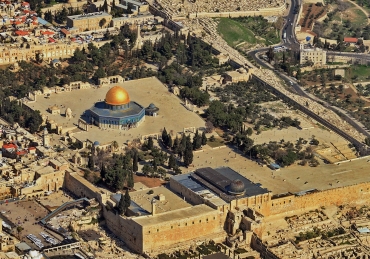Timing and method of duʿāʾ for fasting person
Question
I have read your answers regarding the masnūn Ifṭār duʿāʾs. However, there is some confusion at the moment regarding the timing of the fasting person’s duʿāʾ being accepted, is it at the time of Ifṭār or is it during the fast? Also, is congregational duʿāʾ before Ifṭār recommended in the Masjid?
بسم الله الرحمن الرحیم
Answer
There are three issues here that should not be confused:
- First, the acceptance of a fasting person’s supplication and its timing.
- Second, the masnūn supplications specific to Ifṭār and their timing.
- Third, the ruling on congregational duʿāʾ in the Masjid before Ifṭār.
Each of these issues are addressed separately.
(1) The supplication of a fasting person
It is recommended for a fasting person to supplicate to Allah Almighty throughout their fast and particularly at Ifṭār time.
Abū Hurayrah (d. 57/676-7, may Allah be pleased with him) narrates that the Prophet ﷺ said:
ثلاثة لا ترد دعوتهم: الصائم حتى يفطر، والإمام العادل، ودعوة المظلوم يرفعها الله فوق الغمام ويفتح لها أبواب السماء ويقول الرب: وعزتي لأنصرنك ولو بعد حين
“There are three whose supplication is not rejected: The fasting person until he breaks his fast, the just leader, and the supplication of the oppressed; Allah raises it above the clouds and opens the gates of heaven for it. And the Lord says: ‘By My might, I shall surely aid you, even if it is after a while’” (Sunan al-Tirmidhī, 3598; Sunan Ibn Mājah, 1752; Ṣaḥīḥ Ibn Khuzaymah, 1901; categorized ḥasan (agreeable) by Imam Tirmidhī, d. 279/892).
This ḥadīth suggests that the fasting person’s supplication is accepted whenever he supplicates during the fast. Accordingly, Imam Nawawī (d. 676/1277) writes:
يستحب للصائم أن يدعو في حال صومه بمهمات الآخرة والدنيا له ولمن يحب وللمسلمين، لحديث أبي هريرة قال قال رسول الله صلى الله عليه وسلم: ثلاث لا ترد دعوتهم، الصائم حتی یفطر والإمام العادل والمظلوم، رواه الترمذي وابن ماجه، قال الترمذي: حديث حسن. وهكذا الرواية حتى بالتاء المثناة فوق، فيقتضي استحباب دعاء الصائم من أول اليوم إلى آخره، لأنه يسمى صائما في كل ذلك
“It is desirable for the fasting person to supplicate during his fast for the important matters of the hereafter and the world, for himself, for whomever he wishes and for the Muslims. [This is] due to the ḥadīth of Abū Hurayrah (may Allah be pleased with him) who said: The messenger of Allah ﷺ said, ‘There are three whose supplication is not rejected: The fasting person until he breaks his fast, the just leader, and the supplication of the oppressed.’ Tirmidhī and Ibn Mājah transmitted it and Tirmidhī said: it is a ḥasan (agreeable) ḥadīth. This is how the narration is with the word ‘Ḥattā’ (until), this suggests the desirability of the fasting person supplicating from the beginning of the day until the end, because he is described as a fasting person throughout the day” (Sharḥ al-Muhadhdhab, 6:375).
The deduction of Imam Nawawī is clear, and it is for this reason he has included this ḥadīth in his book al-Adhkār (p.330) under the general chapter of desired readings during the fast and not included it in the next chapter specific to supplications at the time of Ifṭār.
The next question is whether this virtue remains until Ifṭār time enters or until the fasting person eats Ifṭār. Both are possibilities, as ʿAllāmah Munāwī (d. 1031/1622) writes:
أي إلى أن يتعاطى مفطرا، ويحتمل إلى أن يدخل أوان إفطاره وإن لم يفطر بالفعل
“It means: until he breaks his fast, and there is a possibility that it means: until the time of his Ifṭār enters, even if he has not done Ifṭār” (Fayḍ al-Qadīr, 3:300).
However, Imam Ibn Khuzaymah’s chapter heading suggests the first possibility that the virtue remains until he breaks his fast although it could mean the latter because a person is recommended to avoid delaying Ifṭār after sunset. He writes:
باب ذكر استجابة الله عز وجل دعاء الصوام إلى فطرهم من صيامهم، جعلنا الله منهم
“Chapter: The mention of Allah The Mighty, The Venerable, accepting the supplication of the fasting people until their breaking of their fasts, may Allah make us from them” (Ṣaḥīḥ Ibn Khuzaymah, 1901).
This also indicates that according to Imam Ibn Khuzaymah, who is from among the reputable ḥadīth scholars, it is desirable for a fasting person to supplicate throughout the fast and that the aforementioned ḥadīth relates to the entire duration of fasting.
On the other hand, Imam Ibn Ḥibbān (d. 354/965) appears to be of the view that the specific virtue in the aforementioned narration relates to the time of Ifṭār. He writes prior to narrating this ḥadīth:
ذكر رجاء استجابة دعاء الصائم عند إفطاره
“Mentioning the hope of the fasting person’s supplication being accepted at the time of his Ifṭār” (Ṣaḥīḥ Ibn Ḥibbān, 158; al-Iḥsān, 3428).
ʿAllāmah Sindhī (d. 1138/1726) is also inclined to this view. He writes,
والأقرب أن “حتی” سهو من بعض الرواة، والصواب “حین” كما یدل علیه الحدیث الآتي
“It is more likely that the word ‘Ḥattā’ (until he does Ifṭār) is an error from some of the narrators, and the correct word is ‘Ḥīna’ (when he does Ifṭār) as the next ḥadīth indicates” (Ḥāshiyah Sunan Ibn Mājah, 1:533).
This is a reference to another ḥadīth narrated by another companion ʿAbdullāh ibn ʿAmr ibn al-ʿĀṣ (d. 63/683, may Allah be pleased with him) from the Prophet ﷺ who said,
إن للصائم عند فطره لدعوة ما ترد
“Indeed, the fasting person has a supplication at the time of his Ifṭār which is not rejected” (Sunan Ibn Mājah, 1753; al-Mustadrak, 1535; ʿAmal al-Yawm wa al-Laylah, 481; declared ḥasan (agreeable) by Ḥāfiẓ Ibn Ḥajar, d. 852/1149, as quoted in al-Futūḥāt, 4:242).
Similarly, the ḥanbalī jurist ʿAllāmah Ibn Mufliḥ (d. 763/1362) appears inclined to this view. He cites both ḥadīths mentioned above after writing the following:
وأن يدعو عند فطره
“And that he should supplicate at the time of his Ifṭār” (al-Furūʿ, 5:36).
However, the suggestion that the word “Ḥattā” (until he does Ifṭār) in the first ḥadīth is an error is questionable because this is how the narration has been transmitted in most ḥadīth books, and Imam Nawawī has affirmed this is the correct wording, as mentioned above and also in al-Adhkār (p.330) and his other works. Ḥāfiẓ Ibn al-Mulaqqin (d. 804/1401) explains in al-Badr al-Munīr (5:154) that Imam Nawawī explicitly mentioned the pronunciation of the word so that it is not mispronounced as “Ḥīna” (when he does Ifṭār).
It appears that Imam Ibn Ḥibbān and ʿAllāmah Ibn Mufliḥ interpreted the “Ḥattā” (until) to mean “Ḥīna” (when) in light of the ḥadīth of ʿAbdullāh ibn ʿAmr ibn al-ʿĀṣ (may Allah be pleased with him). However, they are two separate narrations as clear from their wording.
Perhaps another reason is that a lengthier version of the same narration of Abū Hurayrah (may Allah be pleased with him) uses the term “Ḥīna” instead of “Ḥattā”. This lengthy narration has been transmitted in Sunan al-Tirmidhī (2526) and Ṣaḥīḥ Ibn Ḥibbān (7387) and the final part of the narration is exactly same as the narration of Abū Hurayrah (may Allah be pleased with him) mentioned above, with the exception of the word “Ḥīna” instead of “Ḥattā”. However, Imam Tirmidhī explains that the isnād (chain) of the narration is not strong and it is not a continuous chain, and thereafter makes reference to the ḥadīth quoted above. It therefore appears that from a narration perspective, the word “Ḥattā” is more correct. This notwithstanding the fact that Ḥāfiẓ Mundhirī (d. 656/1258) has attributed the word “Ḥīna” to Sunan al-Tirmidhī whilst acknowledging that other ḥadīth collections mention the term “Ḥattā” (al-Targīb, 2:53). It is not entirely certain whether Ḥāfiẓ Mundhirī is referring to the shorter narration or the lengthier one, although the former seems more likely because he mentions that Imam Tirmidhī has deemed it ḥasan and only cited the wording of the short narration.
Similarly, when Imam Bagawī (d. 516/1122) quoted this narration of Abū Hurayrah (may Allah be pleased with him) in Maṣābīḥ al-Sunnah (1614) he did so with the word “Ḥīna”. Again, it is not clear whether he is citing the shorter narration or the longer narration. Either way, the commentators of Maṣābīḥ and Mishkāt al-Maṣābīḥ suggest accordingly that the ḥadīth refers to supplicating at the time of Ifṭār.
The next question is what does عند فطره (at the time of his Ifṭār) or حين يفطر (when he does Ifṭār) mean. There are three possibilities based on the statements of scholars: (1) After sunset (2) After Ifṭār (3) The time before Ifṭār whether after or before sunset.
The ḥanafī scholar ʿAllāmah Muẓhirī (d. 727/1326-7) writes:
والصائم يقبل دعاؤه، لأنه فرغ من عبادة محبوبة إلى الله تعالى
“The supplication of the fasting person is accepted, because he has finished from a worship beloved to Allah Almighty” (al-Mafātīḥ, 3:131).
ʿAllāmah Ibn al-Malak al-Ḥanafī (d.p.854/1450) has also mentioned similar (Sharḥ al-Maṣābīḥ, 3:80). Likewise, Mullā ʿAlī al-Qārī (d. 1014/1605) writes:
…قوله: (حين يفطر) لأنه بعد عبادة
“[The supplication is accepted] when he does Ifṭār because it is after a worship …” (Mirqāt al-Mafātīḥ, 4:1534)
These quotes suggest that the accepted supplication at the time of Ifṭār is after sunset.
However, the Shāfiʿī scholars ʿAllāmah Ibn Ḥajar al-Makkī (d. 974/1567) and ʿAllāmah Ibn ʿAllān (d. 1057/1647) appear to have interpreted the ḥadīth of ʿAbdullāh ibn ʿAmr ibn al-ʿĀṣ (may Allah be pleased with him) for after Ifṭār not just after sunset (Tuḥfat al-Muḥtāj, 3:425; al-Futūḥāt, 4:339). This does not mean they disagree with Imam Nawawī’s position regarding the desirability of supplicating throughout the fast based on the ḥadīth of Abū Hurayrah (may Allah be pleased with him). This is because they have mentioned this in the specific context of the ḥadīths that mention supplicating at the time of fasting, such as the ḥadīth of ʿAbdullāh ibn ʿAmr ibn al-ʿĀṣ (may Allah be pleased with him). In other words, any reference to supplicating at the time of Ifṭār refers to after Ifṭār according to ʿAllāmah Ibn Ḥajar al-Makkī and ʿAllāmah Ibn ʿAllān.
My respected father Mufti Shabbir Ahmed (b. 1376/1957) is of the view that ḥadīths that mention عند فطره (at the time of his Ifṭār) or حين يفطر (when he does Ifṭār) could refer to the time just before Ifṭār including the time just before sunset. In other words, the meaning could be: “when he is close to Ifṭār” similar to the ḥadīth كان النبي صلى الله عليه وسلم إذا دخل الخلاء (When the Prophet ﷺ would enter the toilet, Ṣaḥīḥ al-Bukhārī, 142) which means: when he was close to entering the toilet or when he intended to enter it, as explicitly mentioned in a narration of Ṣaḥīḥ al-Bukhārī (142). Another example is the verse فإذا قرأت القرآن فاستعذ بالله من الشيطان الرجيم (When you [intend to] recite the Quran then seek Allah’s protection from the cursed Satan). There are also other similar examples.
Therefore, in the context of the ḥadīth that a fasting person’s supplication is not rejected at the time of Ifṭār, this supplication can be made at any time after sunset and also shortly before sunset. The position of Imam Nawawī and Imam Ibn Khuzaymah has been mentioned above that the supplication of a fasting person is accepted throughout the fast until sunset or Ifṭār.
The discussion above clearly indicates that scholars have mixed views regarding the timing of the acceptance of a fasting person’s supplication mentioned in the ḥadīths. This is primarily because there are two different ḥadīths in this regard. The views mentioned thus far can be summarised as follows:
- The fasting person’s supplication is not rejected during the fast until sunset.
- The fasting person’s supplication is not rejected during the fast until a person does Ifṭār.
- The fasting person’s supplication is not rejected after sunset.
- The fasting person’s supplication is not rejected after Ifṭār.
- The fasting person’s supplication is not rejected shortly before Ifṭār whether after or before sunset.
It appears, and Allah knows best, that all these interpretations are correct and that the supplication of a fasting person is accepted throughout the fast and thereafter upon completion of the fast. In reaching this conclusion, the following has been considered:
1) The preferred wording in the ḥadīth of Abū Hurayrah (may Allah be pleased with him) indicates that the supplication of a fasting person is accepted throughout the fast, as mentioned by Imam Nawawī and prior to him Imam Ibn Khuzaymah.
2) In the Takhrīj of Imam Nawawī’s al-Adhkār, Ḥāfiẓ Ibn Ḥajar appears to concur with Imam Nawawī’s assertion that the narration is transmitted with the word “Ḥattā” (until he does Ifṭār). He mentions a narration of Ṭabarānī which mentions the word “Ḥīna” and does not attribute it to Sunan al-Tirmidhī (al-Futūḥāt, 4:338). This suggests that according to Ḥāfiẓ Ibn Ḥajar, the wording in the brief ḥasan narration of Sunan al-Tirmidhī is as mentioned by Imam Nawawī.
3) Further, Ḥāfiẓ Ibn Ḥajar makes reference to a narration of Abū Hurayrah (may Allah be pleased with him) wherein the Prophet ﷺ is reported to have said generally:
ثلاث دعوات مستجابات: دعوة المسافر ودعوة الصائم ودعوة المظلوم
“Three supplications are accepted, the supplication of the traveler, the supplication of the fasting person and the supplication of the oppressed” (al-Ḍuʿāfāʾ al-Kabīr, 1:72; al-Duʿāʾ, 1313; al-Daʿawāt al-Kabīr, 648; Shuʿab al-Īmān, 3323, 7060; Fawāʾid Ibn Māsī, 12. The narration appears to be at least ḥasan, see Fayḍ al-Qadīr, 3:300; al-Mudāwī, 3:316; al-Silsilah al-Ṣaḥīḥah, 4:406).
This ḥadīth makes no reference to Ifṭār which indicates that the virtue is general and includes the entire duration of the fast, similar to the entire duration of a person’s travel and the entire duration of one being oppressed.
However, it is worth noting that the narration of Sunan Abī Dāwūd (1536), Sunan al-Tirmidhī (1905) and other ḥadīth collections mentions the supplication of a parent instead of a fasting person. However, there is no contradiction between the two and both versions of the ḥadīth are of an acceptable standard, with corroborating narrations, and are therefore correct.
3) Anas ibn Mālik (d. 93/711-2, may Allah be pleased with him) narrates that the Prophet ﷺ said:
ثلاث دعوات لا ترد، دعوة الوالد، ودعوة الصائم، ودعوة المسافر
“Three supplications are not rejected: the supplication of the father, the supplication of the fasting person and the supplication of the traveler” (al-Sunan al-Kubrā, 6392; al-Daʿawāt al-Kabīr, 647; the isnād of this narration is weak, see al-Muhadhdhab fī Ikhtiṣar al-Sunan al-Kubrā, 3:1272; Fayḍ al-Qadīr, 3:301).
This ḥadīth makes no reference to Ifṭār similar to the previous narration and therefore indicates that the fasting person’s supplication is accepted throughout the fast.
4) The narration of ʿAbdullāh ibn ʿAmr ibn al-ʿĀṣ (may Allah be pleased with him) refers to the supplication at the time of Ifṭār. This is further supported by the practice of ʿAbdullāh ibn ʿAmr ibn al-ʿĀṣ who would read the following at the time of Ifṭār as transmitted in the same narration:
اَللَّهُمَّ إِنِّيْ أسْألُكَ بِرَحْمَتِكَ الَّتِيْ وَسِعَتْ كُلَّ شَيْءٍ أنْ تَغْفِرَ لِيْ
“O Allah, I ask You by Your mercy which envelopes all things, that You forgive me.”
5) The companion ʿAbdullāḥ ibn ʿUmar (d. 73/693, may Allah be pleased with them) said,
كان یقال: لكل مسلم صائم دعوة مستجابة عند إفطاره، قال: فكان ابن عمر یقول إذا أفطر: یا واسع المغفرة اغفر لي
“It would be said: Every Muslim fasting person has a supplication at the time of his Ifṭār that is accepted. The narrator said: So, Ibn ʿUmar would say when he would do Ifṭār: ‘Oh The One of abundant forgiveness, forgive me’” (Muʿjam Ibn al-Aʿrābī, 349; Shuʿab al-Īmān, 3620; the isnād of this mawqūf (suspended) narration is good as outlined in our earlier Arabic answer).
6) Duʿāʾs are recommended whilst performing Ṣalāh, at the end of Ṣalāh and thereafter. Likewise, duʿāʾs are highly recommended whilst fasting, at the end of fasting and thereafter. Similarly, duʿāʾs are highly recommended during all stages of Hajj.
In conclusion, the aforementioned ḥadīths and commentary of scholars suggests that the supplication of a fasting person is accepted whilst fasting and also thereafter. It is therefore recommended for a fasting person to supplicate to Allah Almighty throughout his fast and particularly at the time of his Ifṭār. The supplication at the time of Ifṭār can be made just before sunset as the fast is finishing, or after sunset, or after eating Ifṭār. The Ifṭār, however, should not be delayed. The practice of ʿAbdullāh ibn ʿAmr ibn al-ʿĀṣ and ʿAbdullāḥ ibn ʿUmar (may Allah be pleased with them) demonstrates that the companions would supplicate particularly at the time of Ifṭār, and in this regard, it is preferred to read the aforementioned supplications of theirs at this time.
(2) Timing of Masnūn Ifṭār-specific supplications
The second issue which should not be confused with the above is the reading of the masnūn supplications that are specific to Ifṭār in their wording and timing. It is preferred that just before eating dates and water, one reads بسم الله, and after eating dates and drinking water, one reads these Ifṭār specific supplications. This is evident from the wording of the supplications and the explicit statements of most ḥadīth commentators and jurists, as outlined below.
One should note at the outset that the Ifṭār specific supplications are not transmitted in the aforementioned narrations which mention that the supplication of a fasting person is not rejected. Therefore, the narrations should not be confused. However, the virtue would equally apply to these post-Ifṭār supplications, because the ḥadīths pertaining to the acceptance of a fasting person’s supplication includes supplicating after Ifṭār as detailed above.
The timing of the masnūn Ifṭār specific supplications has been addressed in our previous answers. The scholars have explicitly mentioned that the Ifṭār specific duʿās should be read after Ifṭār. The following is the most authentic ḥadīth mentioning an Ifṭār supplication:
كان النبي صلی الله علیه وسلم إذا أفطر قال: ذَهَبَ الظَّمَأُ وابْتَلَّتِ الْعُرُوْقُ وَثَبَتَ الأجْرُ إِنْ شاءَ اللهُ
“When the Prophet ﷺ would do Ifṭār he would say: ‘The thirst has gone, the veins are moistened, and the reward is established, if Allah wills’” (Sunan Abī Dāwūd, 2357, declared ṣaḥīḥ by Imam Ḥākim, d. 405/1014, and ḥasan by Imam Dāraquṭnī, d. 385/995, Imam Ibn Ibn Qudāmah, d. 620/1223, Ḥāfiẓ Ibn Ḥajar and others).
The following commentators and jurists have affirmed that this supplication should be read after Ifṭār:
- ʿAllāmah Muẓhirī al-Ḥanafī (d. 727/1326-7) (al-Mafātīḥ, 3:23).
- ʿAllāmah Ibn Ḥajar al-Makkī al-Shāfiʿī (d. 974/1567) (Tuḥfat al-Muḥtaj, 3:425; Fatḥ al-Ilāh, 6:477).
- Khaṭīb Shirbīnī al-Shāfiʿī (d. 977/1570) (Mugnī al-Muḥtāj, 2:168).
- ʿAllāmah Ramlī al-Shāfiʿī (d. 1004/1596) (Nihāyat al-Muḥtāj, 3:183).
- Mullā ʿAlī al-Qārī al-Ḥanafī (d. 1014/1605) (Mirqāt al-Mafātīḥ, 4:1386).
- ʿAllāmah Ibn ʿAllān al-Shāfiʿī (d. 1057/1647) (al-Futūḥāt, 4:339).
- ʿAllāmah Dasūqī al-Mālikī (d. 1230/1815) (Ḥāshiyat al-Dasūqī, 1:515).
- ʿAllāmah Muṣṭafā al-Ruḥaybānī al-Suyūṭī al-Ḥanbalī (d. 1243/1827) (Maṭālib Uli al-Nuhā, 2:207).
- Shaykh Sharaf al-Ḥaq ʿAẓīmābādī (d. 1329/1911) (ʿAwn al-Maʿbūd, 6:345).
- Shaykh Khalīl Aḥmad Sahāranpūrī al-Ḥanafī (d. 1346/1927) (Badhl al-Majhūd, 11:161).
- The commentator of Sunan Abī Dāwūd, Shaykh Maḥmūd Khaṭṭāb al-Subkī (d. 1352/1933) (al-Manhal al-ʿAdhb al-Mawrūd, 10:81).
Similarly, the wording of the next most famous Ifṭār supplication is transmitted in the following narration:
عن معاذ بن زهرة، أنه بلغه أن رسول الله صلى الله عليه وسلم كان إذا أفطر قال: اَللَّهُمَّ لَكَ صُمْتُ وَعَلَى رِزْقِكَ أفْطَرْتُ
“Muʿādh ibn Zuhrah [a tābiʿī] narrates that a ḥadīth reached him that when the messenger of Allah ﷺ would do Ifṭār, he would say: ‘O Allah, I fasted for You, and with Your sustenance I completed my fast’” (Sunan Abī Dāwūd, 2358; Marāsīl, 99; al-Sunan al-Kubrā, 8134 and others, declared weak by Ḥāfiẓ Suyūṭī, d. 911/1505, however, it is acceptable for practice).
The following commentators and jurists have affirmed that this supplication should be read after Ifṭār:
- ʿAllāmah Muẓhirī al-Ḥanafī (d. 727/1326-7) (al-Mafātīḥ, 3:24).
- ʿAllāmah Ibn al-Malak al-Ḥanafī (d.p.854/1450) (Sharḥ al-Maṣābīḥ, 2:519).
- ʿAllāmah Ibn Ḥajar al-Makkī al-Shāfiʿī (d. 974/1567) (Tuḥfat al-Muḥtaj, 3:425; Fatḥ al-Ilāh, 6:477).
- Khaṭīb Shirbīnī al-Shāfiʿī (d. 977/1570) (Mugnī al-Muḥtāj, 2:168).
- ʿAllāmah Ramlī al-Shāfiʿī (d. 1004/1596) (Nihāyat al-Muḥtāj, 3:183).
- Mullā ʿAlī al-Qārī al-Ḥanafī (d. 1014/1605) (Mirqāt al-Mafātīḥ, 4:1387).
- ʿAllāmah Malyabārī al-Shāfiʿī (d. 1028/1618-9) (Fatḥ al-Muʿīn, 2:279).
- ʿAllāmah Ibn ʿAllān al-Shāfiʿī (d. 1057/1647) (al-Futūḥāt, 4:339).
- ʿAllāmah Muḥammad ibn Aḥmad al-Khalwatī al-Ḥanbalī (d. 1088/1678), who makes reference to the past tense of the Ifṭār verb (Ḥāshiyat al-Khalwatī ʿalā Muntahā al-Irādāt, 2:233).
- ʿAllāmah Dasūqī al-Mālikī (d. 1230/1815) (Ḥāshiyat al-Dasūqī, 1:515).
- Sayyid al-Bakrī al-Dimyāṭī al-Shāfiʿī (d. 1310/1893) (Iʿānat al-Ṭālibīn, 2:279).
- The commentator of Sunan Abī Dāwūd, Shaykh Maḥmūd Khaṭṭāb al-Subkī (d. 1352/1933) (al-Manhal al-ʿAdhb al-Mawrūd, 10:81).
- ʿAllāmah Muṣṭafā al-Ruḥaybānī al-Suyūṭī al-Ḥanbalī (d. 1243/1827) (Maṭālib Uli al-Nuhā, 2:207) appears inclined to this based on the first supplication.
This is supported by the wording of the narration in some sources which mentions the following:
كان رسول الله صلى الله عليه وسلم إذا صام ثم أفطر قال: اللهم لك صمت، وعلى رزقك أفطرت، هذا لفظ عبد الله بن المبارك في الزهد (١٤١١) وابن أبي شيبة (٩٧٤٤) ومحمد بن فضيل الضبي في الدعاء (٦٦)۔
“When the messenger of Allah ﷺ would fast and then do Ifṭār, he would say: اَللَّهُمَّ لَكَ صُمْتُ وَعَلَى رِزْقِكَ أفْطَرْتُ.”
The ḥadīth scholar Imam Abū Muḥammad al-Ḥārith ibn Muḥammad ibn Abī Usāmah (d. 282/896) transmits a long narration in his Musnad which is more explicit in this regard:
يا علي إذا كنت صائما في شهر رمضان فقل بعد إفطارك: اللهم لك صمت وعليك توكلت وعلى رزقك أفطرت
“O ʿAlī, when you are fasting in the month of Ramaḍān, then say after your Ifṭār: اللهم لك صمت وعليك توكلت وعلى رزقك أفطرت” (Bugyat al-Ḥārith, 1:526; al-Maṭālib al-ʿĀliyah, 6:141; Itḥāf, 3:413; the chain is very weak).
Thus, it is preferred that the Ifṭār duʿās are read after Ifṭār, and this is also apparent from the words of the duʿāʾs. The thirst being quenched and the veins becoming moist only occurs after Ifṭār. The second duʿāʾ uses the past tense of Ifṭār, although sometimes past tense can be used for the future.
Accordingly, some scholars are of the view that reading the second supplication (اَللَّهُمَّ لَكَ صُمْتُ وَعَلَى رِزْقِكَ أفْطَرْتُ) before Ifṭār will also fulfil the Sunnah whilst some others suggest that it is preferable. The following narration may provide some basis for this:
إذا قرب إلى أحدكم طعام وهو صائم فليقل: باسم الله، والحمد لله، اللهم لك صمت وعلى رزقك أفطرت، سبحانك وبحمدك، تقبله مني إنك أنت السميع العليم
“When food is brought close to one of you whilst fasting, he should say: باسم الله، والحمد لله، اللهم لك صمت وعلى رزقك أفطرت، سبحانك وبحمدك، تقبله مني إنك أنت السميع العليم” (Tartīb al-Amālī al-Khamīsiyyah, 1:344).
There are several points worth noting: (1) The isnād of this narration is extremely weak. (2) The wording of the supplication is substantially different although it includes the supplication in question. (3) The narration of Imam Abū Muḥammad al-Ḥārith ibn Muḥammad ibn Abī Usāmah is also extremely weak, however, its text is more explicit than this narration in relation to the timing. This narration could be interpreted to mean ‘he should say [after Ifṭār]’.
Nevertheless, if someone reads this supplication (اَللَّهُمَّ لَكَ صُمْتُ وَعَلَى رِزْقِكَ أفْطَرْتُ) before Ifṭār, the Sunnah will be fulfilled inshāʾ Allah, due to this view of some scholars. Historically, ʿAllāmah Ibn ʿAllān (d. 1057/1647) has also cited a view that reading this supplication alongside Ifṭār or before Ifṭār will fulfil the Sunnah (al-Futūḥāt, 4:339). However, he disagrees with it, and it is therefore preferred in light of the position of most scholars and the agreed timing of the first supplication (ذَهَبَ الظَّمَأُ وابْتَلَّتِ الْعُرُوْقُ وَثَبَتَ الأجْرُ إِنْ شاءَ اللهُ) which is the most authentic Ifṭār supplication, that this supplication is also read after Ifṭār.
There are two other important points to note:
First, the common practice is that people complete their fasts with dates and water and thereafter perform Maghrib Ṣalāh and thereafter eat food. One does not need to wait to eat food to supplicate with these duʿāʾs. Rather one should read these duʿāʾs after eating dates and drinking water as this is Ifṭār, and it is as this point that the veins are moistened and the thirst is quenched. The ḥanafī ḥadīth commentator, ʿAllāmah Muẓhirī (d. 727/1326-7) writes:
هذا الدعاء يقرأ بعد الإفطار بالماء
This supplication should be read after Ifṭār with water (Mafātīḥ, 3:23)
Second, many people forget the Sunnah of Tasmiyah before doing Ifṭār. There is no difference of opinion that Tasmiyah (بسم الله) should be read before eating. Its timing is unanimously agreed upon. This Sunnah therefore should not be forsaken.
In conclusion, Tasmiyah (بسم الله) should be read before Ifṭār, and the supplications (ذَهَبَ الظَّمَأُ وابْتَلَّتِ الْعُرُوْقُ وَثَبَتَ الأجْرُ إِنْ شاءَ اللهُ) and (اَللَّهُمَّ لَكَ صُمْتُ وَعَلَى رِزْقِكَ أفْطَرْتُ) and other Ifṭār supplications outlined in an earlier answer should be read after Ifṭār preferably after eating dates and drinking water. If, however, someone reads the second supplication before Ifṭār, this will also suffice according to some scholars.
(3) Congregational duʿāʾ in the Masjid before Ifṭār
The third and final issue is the status of congregational duʿāʾ in the Masjid before Ifṭār. Congregational duʿāʾ before Ifṭār is not Sunnah. Therefore, duʿāʾ should be made individually. A person is aware of his needs and should supplicate to Allah accordingly. Duʿāʾ can be made in any language using any words, although it is preferred to use masnūn supplications. If congregational duʿāʾ is done occasionally to teach people, this will be excused as long as the mode is not regarded Sunnah or superior and it does not become a regular occurrence.
The former Grand Mufti of India, Mufti Maḥmūd Ḥasan Gangohī (d. 1417/1996) writes,
یہ طریقہ کہ ایسے وقت میں اجتماعی دعا کی جائے حضرت نبی اکرم ااورصحابۂ کرام رضوان اللہ تعالیٰ علیہم اجمعین اورفقہائے مجتہدین سے ثابت نہیں،اگر امام صاحب تعلیم کے لئے ایک دودفعہ دعا کرادیں ، پھرروزہ دار اپنی اپنی جداگانہ دعاکرلیا کریں ، توبہتر ہے اوراس اجتماعی دعا کو تر ک کیا جائے۔
“This method of having a congregational duʿāʾ at this time [shortly before Ifṭār] is not established from the Prophet ﷺ, the companions (may Allah have mercy on them all) or the jurists. If the Imam does it once or twice to educate, and thereafter those fasting supplicate individually, then this is better, and this congregational duʿāʾ should be discontinued” (Fatāwā Maḥmūdiyyah, 12:93; Farooqia edition, 10:213).
A Fatwa issued from Darul Uloom Deoband on 19 October 2009 states:
شریعت میں افطار سے قبل اجتماعی دعا ثابت نہیں ہے، البتہ افطار کے وقت دعا کی قبولیت کا وعدہ ہے، اس لیے انفرادی دعا کرنا چاہیے ۔
“Congregational duʿāʾ before Ifṭār is not established in Shariah. However, there is a promise that duʿāʾ at the time of Ifṭār is accepted, therefore one should supplicate individually.”
Similarly, Mawlānā Khālid Sayf Allah Raḥmānī (b. 1376/1956) writes:
اگر افطار سے پہلے معمو ل بنا ئے اور لازم سمجھے بغیر کبھی کبھی اجتماعی دعاء کر لی جائے ، تو ا س کی گنجا ئش ہے ،لیکن اس کو روزانہ کا معمو ل نہ بنا یا جائے ،اور اس پر اصرار نہ کیا جائے اور اسے ضروری نہ سمجھاجائے ۔
“If congregational duʿāʾ is undertaken occasionally before Ifṭār without making it a regular occurrence or regarding it necessary, then there is scope for it, however, it should not be done daily, there should be no insistence on it, and it should not be regarded necessary” (Kitāb al-Fatāwā, 3:427).
The former Grand Mufti of the Indian state of Gujarat, Mufti ʿAbd al-Raḥim Lājpūrī (d. 1422/2001) writes:
جس عبادت کے لئے اجتماع ثابت نہ ہو اگر اہتمام والتزام کے ساتھ اجتماعی طریقہ سے اس کو ادا کیا جائے گا تووہ مناسب طریقہ نہ ہوگا اور اس سے روکا جائے گا اور اسلاف عظام سے ا س کا بھی ثبوت ہے اس کے چند نمونے ملاحظہ ہوں ۔
“If congregation is not established for an act of worship and it is undertaken in congregation with importance and rigid observance, this will not be an appropriate method and people will be prevented from it, and this [act of prevention] is established from the great predecessors, you can read some examples here” (refer to Fatāwā Raḥīmiyyah, 2:218, for the examples).
From earlier scholars, the following is narrated from Imam Aḥmad ibn Ḥanbal (d. 241/855) and Imam Isḥāq ibn Rāhwayh/Rāhūyah (d. 238/853):
قال إسحاق بن منصور الكوسج: قلت: يكره أن يجتمع القوم يدعون الله سبحانه وتعالى ويرفعون أيديهم؟ قال: ما أكرهه للإخوان إذا لم يجتمعوا على عمد، إلا أن يكثروا. قال إسحاق كما قال. وإنما معنى أن لا يكثروا: يقول: أن لا يتخذونها عادة حتى يعرفوا به
“Isḥāq ibn Manṣūr al-Kawsaj [d. 251/865] said: I said [to Imam Aḥmad]: ‘Is It makrūḥ (severely disliked) for people to gather to supplicate to Allah Almighty and raise their hands?’ He said: ‘I do not regard it makrūh for the brothers, as long as they do not gather deliberately [for this], unless they do it frequently [in which case it will be makrūh irrespective]. Isḥāq said the same as he [Aḥmad] said. And the meaning of ‘they do not do it frequently’ is that they do not make it a habit such that they become known by it” (Masāʾil al-Imam Aḥmad ibn Ḥanbal wa Isḥāq ibn Rāhwayh li al-Kawsaj, 9:4879; Iqtiḍāʾ al-Ṣirāṭ al-Mustaqīm, 2:140; al-Ādāb al-Sharʿiyyah, 2:102).
In conclusion, congregational duʿāʾ should be avoided before Ifṭār and people should be encouraged to supplicate individually. If, however, it is done, it should not be regarded Sunnah nor should it become a regular occurrence.
Allah knows best
Yusuf Shabbir
11 Ramadan 1441 / 4 May 2020
Approved by: Mufti Shabbir Ahmad and Mufti Muhammad Tahir






Is it mustahab to eat dates in Suhur?